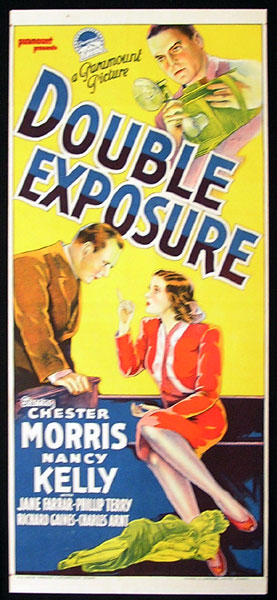IMDb meta-data is runtime of one hour and three minutes, rated 6.4 by 121 cinematizens
Genre: Mystery, comedy

Verdict: A mile a minute
The set-up: Boston Blackie poses as the editor of a photo-news magazine called ‘Flick,’ a hybrid of People and National Inquirer. The owner is a health fanatic who hands out carrots as incentives. What McKinsey seminar did he attend?
Circulation is not what is should be. Even though their sensational photographs are faked, they are not very good fakes. They need new blood. They scan newspapers for sensational photographs and land on one. The decisive carrot sends a telegram to the Iowa snapper, a Pat Kelly, with an offer too good to refuse. Who can say no to a carrot a day?
Pat leaps on the train, leaving her Iowa boyfriend, Spectacles, behind even though he has helped her fake her photographs, including the one that caught the eye of the Big Carrot .
With it so far? It is all fake.
She arrives at the New York offices. Consternation follows. She is a she. Blackie quickly recovers and begins to see opportunities here. Yep. Leachery follows. Pat may be country but she is no bumpkin. She fends him off with references to her big Iowa brother who is staying with her in the Big Berg. Blackie is five foot nothing and takes the hint.
The plot thickens when Spectacles does show up and Pat, with difficulty, convinces him to play the brother role she had already cast.
Pat gets to work and with brass, wit, and a disarming honesty gets some nifty pixes. The real thing. Blackie is impressed. He never thought of that. Real events. In the excitment Carrot changes to handing out turnips.
See, I said it was fast-moving.
Then, finally, a stiff shows up. It’s complicated. Pat staged a mystery shoot for a ‘Flick’ promotional piece, which was then copied in a real murder. The cops pounce.
Blackie sees more opportunities here. It had to be spelled out for the fraternity brothers. First, by leaving Pat in the slammer for a while they get material for an exposé of police incompetence, terrible conditions in jail, the poor hygiene of other prisoners, or the poor Wi Fi in New York City jails. Second, when he springs her then her gratitude will exceed the Hayes Code. Perfect. What can go wrong?
Well when Blackie and Carrot tell Plod about the promotional stunt figuring it will be Open Sesame, the cops play (as usual) dumb. Oh, oh. Pat is still it in The Big House.
Much desperate this and that follows and Blackie fakes another photograph to flush out the real killer. Whew!
Meanwhile Specactles has gone and got married to another woman so that all can live happily ever after, the end.
Nancy Kelly as Pat carries the show and Phillip Terry is marvellous as Spectacles. The ever reliable Richard Gaines as the Big Carrot is brisk and efficient. Charles Arnt is a charming rouge and Claire Rochelle runs ‘Flick’ so subtly none of the men realise it. Director William Berke keeps it moving full tilt. He worked in television in the 1950s after about eighty B-movies in the 1940s. He also produced and wrote.
Kelly was a baby model at age one, and as a child appeared opposite Gloria Swanson. She was the Bad Seed in the ‘Bad Seed’ (1956) and Walter Kerr said it was an astounding performance. She did it first on Broadway and then in film. Seeing the film made me glad I did not have a sister. Kelly also did much television
Terry was the lead in ‘Seven Keys to Baldplate’ (1947) discussed elsewhere on this blog. He was one of those B movie actors who went into television. Innuendo has it that it was as a toy boy for Joan Crawford that he started his film career. Even so his film career was blah and he turned to real estate with great financial success.
Richard Gaines flew to Mars in ‘Flight to Mars’ (1951) discussed elsewhere on this blog.
The film was released on 18 December 1944 while the Battle of the Bulge had just began in Western Europe with a series of German victories and advances. At the same time MacArthur’s return to the Phillipines was being fought out on Mindoro. The siege of Bastogne had begun as the film travelled to theatres across the country. More German victories followed. The newsreel on the bill with this film would have covered all of this. Yellow telegrams arrived from both the Pacific and European Wars. Diversion would have been most welcome.
Skip to content
